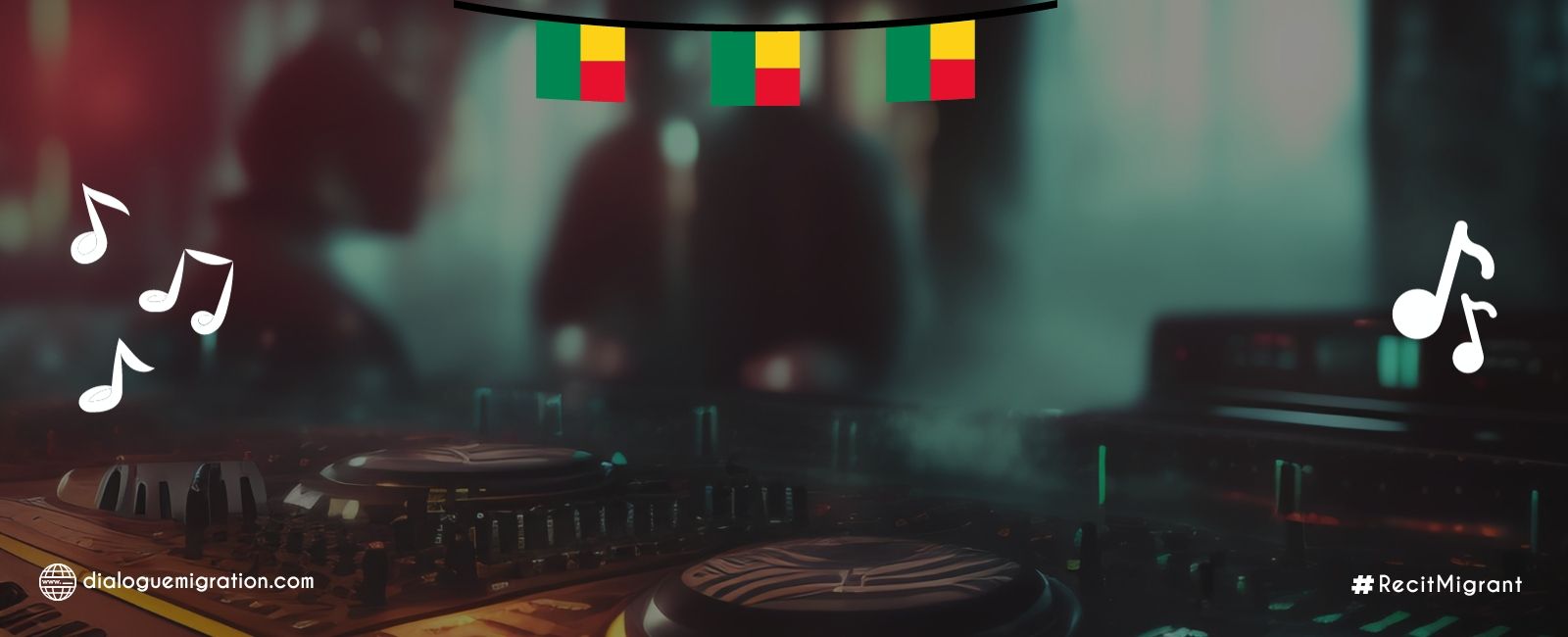

This is something he makes no secret of. For him, life in Benin is a second chance in heaven. An “enfant terrible” of Abobo in Côte d’Ivoire, he is now one of the most famous DJs in his adopted country, where he has lived for over a decade.
Let’s take a look at the atypical career of this thirty-year-old, who left his homeland, Côte d’Ivoire, 12 years ago, full of uncertainty. Now at the pinnacle of showbiz in an African country, he doesn’t seem to be overly keen on migrating to the Western world.
An electric atmosphere invades you as soon as you push the doors of this nightclub located on the outskirts of Cotonou, called “Dallas Club”. It’s a Friday night. As usual at the beginning of the weekend, Isaac DJ is at the helm. His real name is Isaac Dakouri, he no longer needs any introduction in Cotonou and its surroundings and even in some major cities of the country. His name sits on many visuals and other event posters.
He also has been working as a DJ in a telephone company.
With his looks and dreadlocks, Isaac DJ is easily noticed in a crowd. The atmosphere on the premises testifies to his works on the mixtracks. Night club customers are entitled to sequences of different hits, from the sub-region and the planet… A whole rhythmic mix with light shows to drive crazy music lovers who heat up the dance floor or are stuck between their seats and tables filled with drinks of all kinds.
At the beginning, Isaac DJ was marked in Benin, by the clear difference on many levels with Côte d’Ivoire. Today he approaches this with circumspection. “By the grace of God I arrived in Benin, I am now a DJ host, everything God does is good,” he said. He says that when he landed in Benin, he already mastered the computer tool, “and I know how to express myself … ” he insists on specifying. It is a significant asset that has contributed to his integration into the Beninese showbiz.
Lives and experiences…
Integrating into a host country is not easy. Isaac DJ lifts the veil on his case. “Honestly, in a neutral environment it’s difficult to make a name for yourself,” he says, looking into the void. He talks about part of his career: “When I arrived in Benin, I did shoe repair in a professional workshop. Currently I am at the Beninese Federation of Roller Sport, where I am a referee”. In his footsteps, he coaches his little girl who, like him, devotes herself to rollerblading: “Every weekend, I also rollerblade with my three-year-old daughter,” he says with pride. While telling his story, he shows pictures of him and his daughter on skates in his phone. As well as those in which, he hosts competitions organised in Cotonou, in the presence of officials. Despite all his trials and tribulations, he seems to be gradually turning the page.. “There are these moments that allow us to forget these difficult dark times,” he admits.
“God gave me a second chance in Benin”
Isaac DJ is one of the “survivors” of the socio-political crisis in his country Côte d’Ivoire. He narrowly escaped the events of 2010-2011 in Côte d’Ivoire. Born in Abobo, where he spent all his childhood, he attended the Lycée technique moderne Le Maou. When the situation escalated in 2011, his parents asked him to leave the country. His life was only saved on a stroke of luck, he says. “God gave me a second chance and I arrived in Benin. Today, I am what I am. I have a small family, a roof over my head and I manage to get by,” he says.
However, when he arrived in Benin, not everything would go smoothly. “I arrived in Cotonou in November 2011. I took the CTI bus to Benin… When I arrived, I was sleeping at the Friendship Stadium, where Haoujou motorcycles are sold. The one who was supposed to pick me up hadn’t arrived. It was days after I started doing some odd jobs, that I was able to re-contact the person so that they could pick me up, ” he recalls.
In Benin, he will integrate through the profession of Disc Joker (DJ), thanks to the Coupé-décalé, this Ivorian urban music very fashionable at the time in the sub-region. “In Côte d’Ivoire, we were already doing shows like ”Wozo Vacances” where dance groups from every locality of the country came to express themselves at the Hotel Ivoire for the little ones and ”Variétoscop”, which is the same concept for the older ones. At the time, I was a choreographer and hung out with some people who were at their beginning and who would later become big stars, like DJ Arafat,” he says.
His integration and his fame today, Isaac DJ owes it to his abnegation and his sense of resourcefulness. He rode his hump in Cotonou and travelled the country from South to North. “When I arrived in Benin, I started as a DJ in California club, then I went to Bohicon in the centre, Parakou, and Natitingou in the north. I came back to Cotonou afterwards. I did renowned clubs like the National Eleven, Bar Rio, and Destiny where I was party manager and Bluetooth, » he says.
Perceptions on migration in the sub-region
Isaac DJ married a Beninese woman and also learned to speak Fon, one of the most common languages in the country. “Practically, I learned Fon. I’m going to tell you something. My mother is a Beninese national. Being little I never knew. I never knew my mom is Beninese. My father is from the Dakouri family. As for her mother, she was born in Côte d’Ivoire, but her parents are of Beninese origin. I learnt about this once in Benin. She’s from the Ahoyo family,” he says. Elements that underpin his opinion on migration in Africa. “No, there are no borders, we are all Africans. Today if you go to Ivory Coast, there are Beninese in Gonzague city, in Dioufou in Grand Bassam; and we are talking about Benin, Burkina Faso, Mali, Senegal… It is the Europeans who have put the borders, otherwise we form a single country,” he pleads.
“The advice I can give to my brothers is that being in Africa you can get what you want. But, it may happen that we want to travel to know other countries. In Africa we have everything, the proof is that it is in Africa that Europeans come to draw resources,” he says.
Isaac DJ has forged a shell and invites those who are outside their country of origin to show self-sacrifice. “Being a foreigner in a country is not inevitable. You can be a stranger and become a hero with faith and determination. The future is being built,” he concludes.


